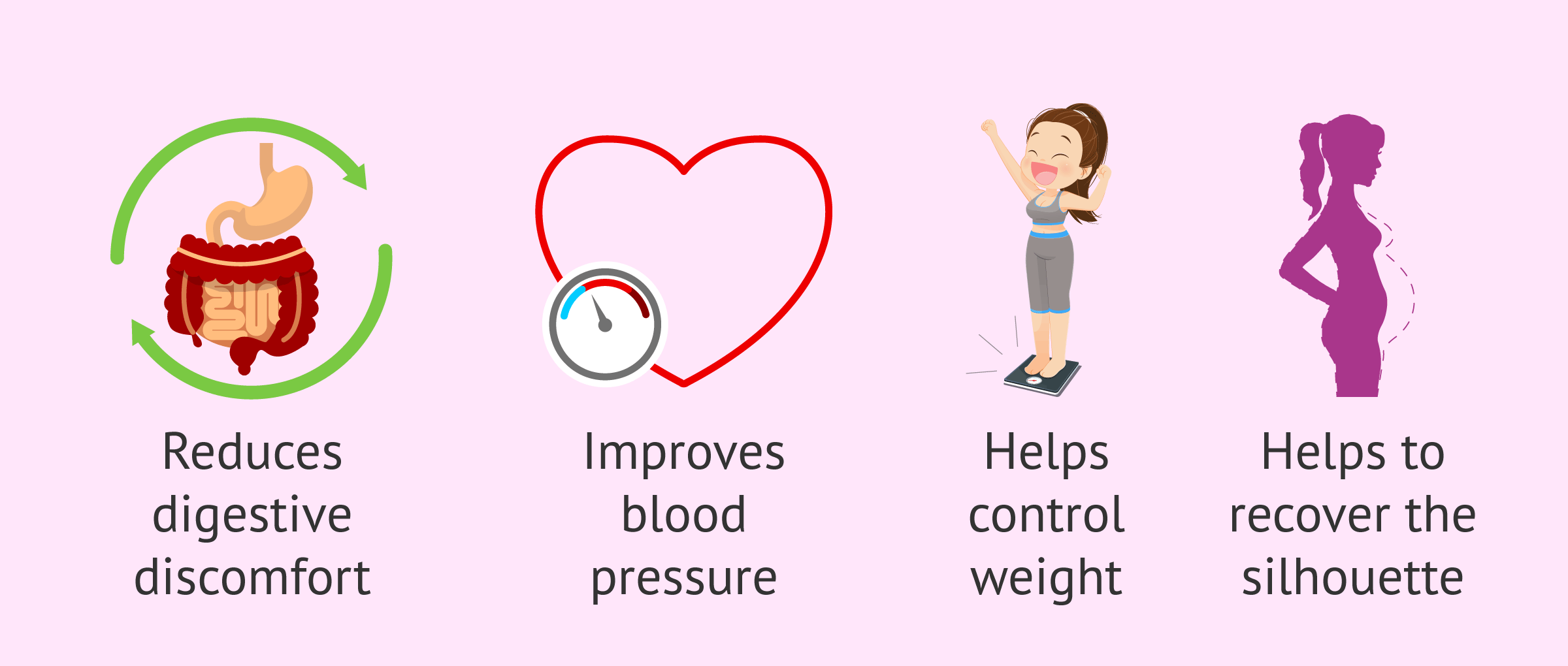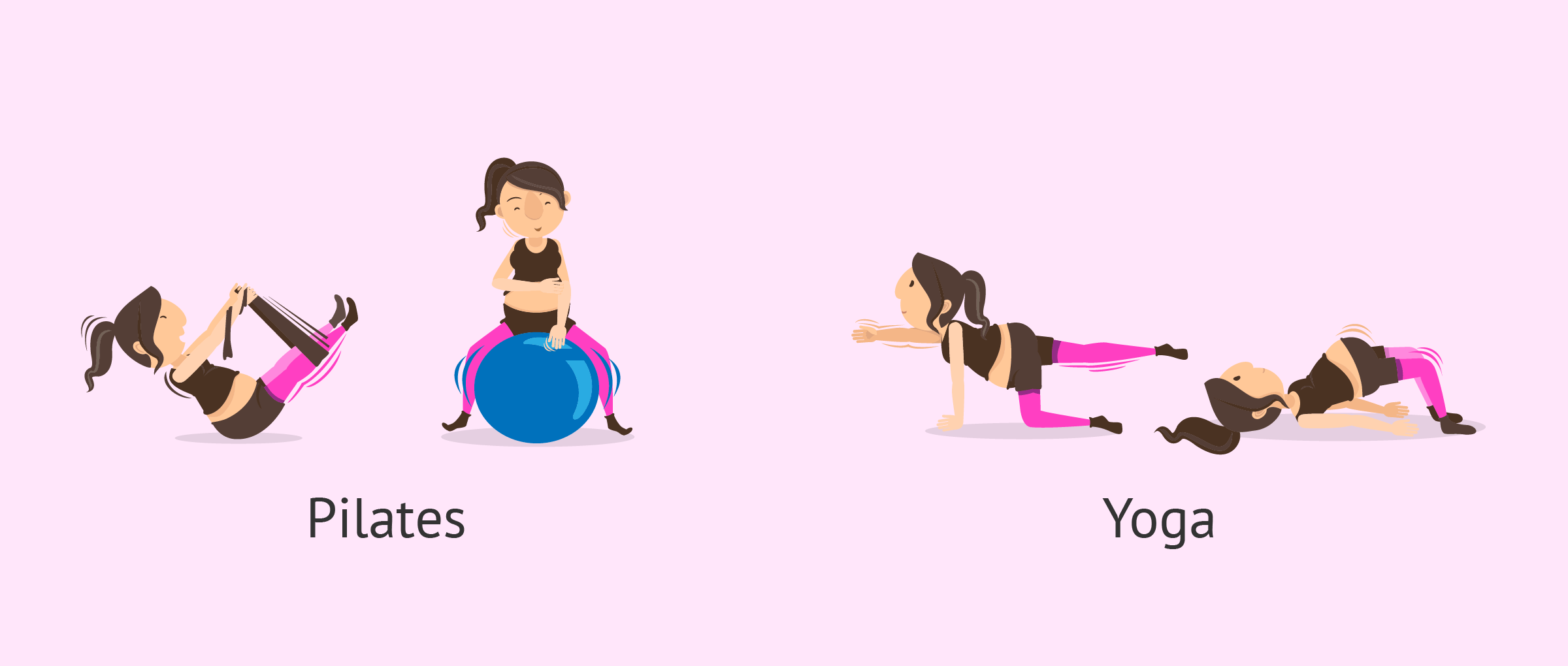Physical activity is recommended for all pregnant women, as it provides them with the strength and endurance necessary to maintain pregnancy and have a smooth delivery.
However, not all sports and exercises are appropriate. The intensity of these exercises should be light or moderate, so as not to harm the baby.
Provided below is an index with the 7 points we are going to expand on in this article.
- 1.
- 2.
- 2.1.
- 2.2.
- 2.3.
- 2.4.
- 3.
- 3.1.
- 3.2.
- 3.3.
- 4.
- 4.1.
- 4.2.
- 4.3.
- 5.
- 6.
- 7.
Benefits
In general, all doctors and specialists recommend women to exercise throughout pregnancy, as long as it is not considered a risky pregnancy.
The reason is that physical activity provides multiple benefits for the health status of the pregnant woman. Among them, we can highlight the following:
- Reduces digestive discomfort and constipation
- Reduces anxiety, depression and insomnia
- Increases elasticity in the joints
- Improves blood pressure
- Helps control weight and prevent obesity
- Increases psychological well-being
- Reduces the risk of gestational diabetes
- Helps to regain the silhouette sooner after childbirth
In addition, it has been shown that sport reduces the time spent in the hospital after childbirth and reduces the number of cesarean sections.
Sports in pregnancy
Women who already practiced a sport before pregnancy can continue with it, although it is advisable to reduce the intensity and consult with the doctor if there are any contraindications.
On the other hand, pregnant women who are not used to exercising should find one that they feel comfortable with and start doing it gradually.
Below, we will discuss the most recommended sports during pregnancy and some practical advice.
Walking
Walking is the most suitable exercise for women who do not usually practice any sport on a regular basis, since it does not require any previous training and it is possible to start at a slow pace.
In general, it is recommended to walk for about 20-40 minutes and with a frequency of 3 times per week.
Going for a walk is the most recommended sport for pregnant women in the first trimester, before the 12-week ultrasound and confirming that the pregnancy is progressing favorably.
Walking has multiple benefits during pregnancy, as it improves circulation, and prevents swelling of the legs, constipation, hemorrhoids, etc.
Besides, walking is a perfect excuse to be outdoors, have a moment of disconnection, or even go out with company. However, there are some precautions to take into account, such as wearing comfortable clothes, using sunscreen, wearing a hat if it is hot and always carrying a bottle of water to keep hydrated.
Swimming or aqua aerobics
Water exercises are highly recommended during pregnancy, since keeping the body submerged greatly reduces physical weight and the risk of injury. Water also prevents the body from overheating while exercising.
Swimming or other aquatic activities improve muscle tone, blood circulation, breathing, etc. They also help you relax, combat back pain and help sleep better at night.
In the case of swimming or aqua aerobics, there is no inconvenience in practicing them during the second or third trimester of pregnancy. These women will feel very comfortable floating in the water, as they do not have to bear the full weight of the belly.
However, it is advisable to stop going to the pool in the last 6 weeks of pregnancy, as there is a risk of infection.
Cycling
Cycling is also an appropriate activity from the beginning of pregnancy, as it greatly improves circulation in the legs and helps to keep in shape.
However, it is not recommended to ride a bicycle after the fifth or sixth month of pregnancy, as it is more difficult to keep your balance with your belly and you could fall.
One option to avoid possible blows or falls is to use the exercise bike in the last months of pregnancy, but without overexertion and with good ventilation to prevent the body from increasing its temperature too much.
Yoga or pilates
These sports, although not cardiovascular, are also highly recommended throughout pregnancy because they help increase flexibility and strength. However, it should be noted that not all exercises are possible.
In particular, to practice the Pilates method, it will be necessary to consult a professional who will indicate which specific exercises are recommended for pregnant women.
In addition to the benefits, we have already discussed physical exercise during pregnancy, both yoga and Pilates help to improve body posture, reduce the weight and pressure of pregnancy, eliminate the feeling of fatigue and, above all, favor the bond and communication between mother and fetus.
Medical advice
Once the woman knows she is pregnant and goes to the doctor for a first check-up, it is advisable to ask what sports or physical activities would be most appropriate for her case.
If the woman already has some previous sports habits, the doctor will point out if it is necessary to make some changes or if the woman can continue with her routine exercises.
On the other hand, if the woman is sedentary or only practices physical exercise occasionally, it is likely that the doctor will advise her to look for a personal trainer or will set guidelines to follow a training program.
In any case, the prescription of physical exercise must be individualized and personalized.
Exercise intensity
As we have already indicated throughout this post, physical exercise during pregnancy should be of moderate intensity.
If the woman was already practicing a sport before, it is not advisable to increase the intensity with this new condition and, in the case of high-intensity sports, it would be advisable to slow down the pace or change exercises if the doctor considers it necessary.
If you do not practice any sport as usual, pregnancy is the best time to start keeping in shape. However, it is advisable to start with light intensity exercises and gradually increase the pace.
To monitor heart rate, the best option would be to use a heart rate monitor during aerobic activities. It should be noted that the intensity of the exercise should not exceed 70% of the maximum oxygen volume of the pregnant woman.
What to avoid?
In general, it is advisable to avoid contact sports and those practiced on hard surfaces that increase abdominal pressure, such as soccer, basketball, volleyball, martial arts, etc.
It is also not advisable to do high-intensity exercises or exercises that require excessive work of the abdominal muscles.
In the case of sportswomen, they can continue to practice these specific sports, but with great caution and taking the necessary measures to avoid dehydration and temperature increase.
Some sports such as aerobic or apparatus gymnastics, water or alpine skiing, skating, racquet sports, etc. can continue to be performed in short sessions. As for tennis and badminton, it is advisable to avoid the sporting gesture of the service because of the amplitude of movements it requires.
Other recommendations
In addition to all the above, there are more tips and precautions when exercising during pregnancy, such as the following:
- Wear appropriate clothing and footwear.
- Before any sport, warm up your muscles with stretching exercises.
- Adequately control food intake to ensure the necessary calories.
- Take breaks as necessary to rest and drink fluids.
- During the second and third trimester, it is advisable not to exercise lying on your back, as this reduces uterine blood flow.
- Flexibility should be worked on, if possible, on a daily basis.
It is important that all women take these recommendations into account so that the fetus is not harmed and can have a healthy pregnancy and delivery.
FAQs from users
What physical activities are allowed during pregnancy?
First of all, it is advisable to perform aerobic exercises to improve cardiorespiratory capacity and musculoskeletal condition. Walking and swimming are the best sports for this purpose. On the other hand, it is necessary to do activities that contribute to muscular endurance and flexibility, such as pilates or yoga.
Is it convenient to do sports in the first month of pregnancy?
This depends on each woman and her specific physical condition. In general, it is possible to do physical exercise from the beginning of pregnancy if it is not contraindicated. However, women who have very uncomfortable symptoms, such as nausea, begin to do sport from the second trimester onwards.
It is recommended to go for a walk 2 or 3 times a week during the first months of pregnancy, as this also helps to improve the initial symptoms of pregnancy.
Can I do Zumba during pregnancy?
Sports that involve some form of dancing can still be done during pregnancy, as long as they are modified and adjusted as the pregnancy progresses. However, it is important to avoid jumping, pirouettes and any movement that may pose a danger.
Recommended readings
There are specific sports and exercises to strengthen the pelvic floor and prepare the woman for childbirth. If you want to read more about this, you can access the following post: Kegel exercises.
We make a great effort to provide you with the highest quality information.
🙏 Please share this article if you liked it. 💜💜 You help us continue!
References
Author
More information about Cristina Algarra Goosman






Hi, I’m a fairly frequent athlete and just found out I’m pregnant. I am worried that the exercise I do is too intense for the baby and therefore there may be complications. I am 8 weeks pregnant and do boxing. Thank you
Hello Stephanie,
Doing sports during pregnancy is something recommended as it has benefits for both mother and baby. However, an excessive amount of sport or a dangerous sport can cause problems.
Boxing is a sport in which there is a risk of serious trauma so it would be recommended to perform another type of exercise in which the fetus is not exposed to blows or possible falls.
I hope I have solved your doubt,
Best regards
Great ideas…
Thank you very much, CrystalRowland 🙂
Hello there,
I’m on my 14th week of pregnancy and wondering now whether I can find out my baby’s gender now! And also, when I just just 2 weeks pregnant I practiced swimming but it was about holding your breath underwater, do you know if this could affect my baby? I’m concerned now.
TIA
Hello Virginia,
Holding your breath for a few seconds would be just fine, so don’t worry. As long as you didn’t hold your breath to the point of blacking out or dizziness, there is no way it could have damaged your baby. Bear in mind that some people do this while sleeping, without even realizing they do so, and this applies to pregnant women as well.
Best wishes